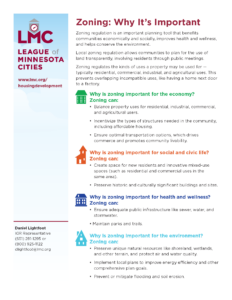Zoning: Why It’s Important
Zoning regulation is an important planning tool that benefits communities economically and socially, improves health and wellness, and helps conserve the environment.
Local zoning regulation allows communities to plan for the use of land transparently, involving residents through public meetings.
Zoning regulates the kinds of uses a property may be used for — typically residential, commercial, industrial, and agricultural uses. This prevents overlapping incompatible uses, like having a home next door to a factory.
View full-size Zoning: Why It’s Important handout (pdf)
Why is zoning important for the economy?
Zoning can:
• Balance property uses for residential, industrial, commercial, and agricultural users.
• Incentivize the types of structures needed in the community, including affordable housing.
• Ensure optimal transportation options, which drives commerce and promotes community livability.
Why is zoning important for social and civic life?
Zoning can:
• Create space for new residents and innovative mixed-use spaces (such as residential and commercial uses in the same area).
• Preserve historic and culturally significant buildings and sites.
Why is zoning important for health and wellness?
Zoning can:
• Ensure adequate public infrastructure like sewer, water, and stormwater.
• Maintain parks and trails.
Why is zoning important for the environment?
Zoning can:
• Preserve unique natural resources like shoreland, wetlands, and other terrain, and protect air and water quality.
• Implement local plans to improve energy efficiency and other comprehensive plan goals.
• Prevent or mitigate flooding and soil erosion.
